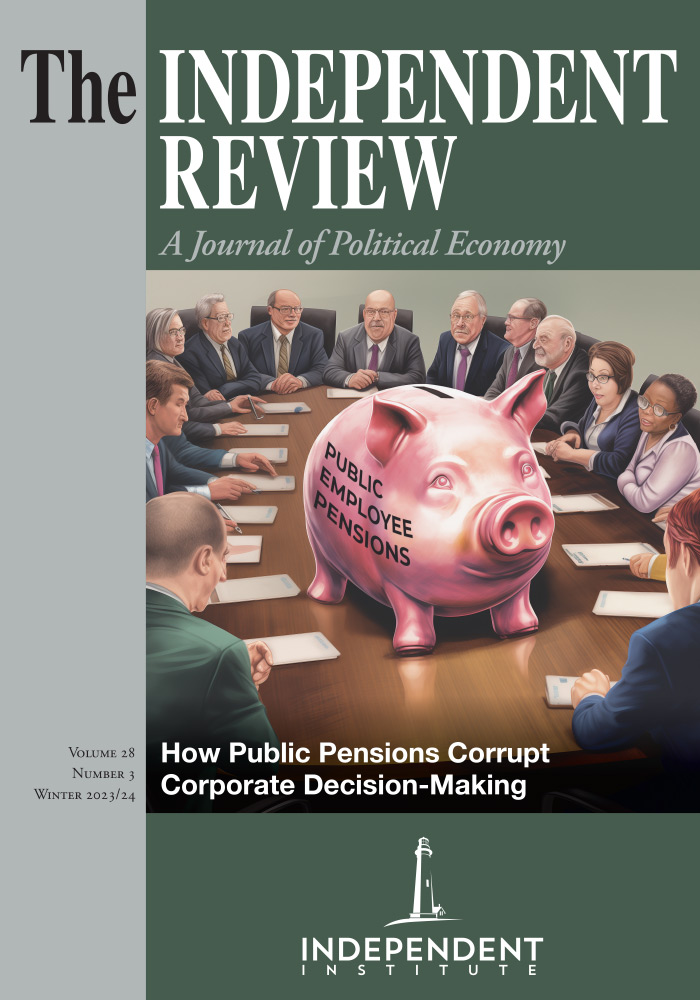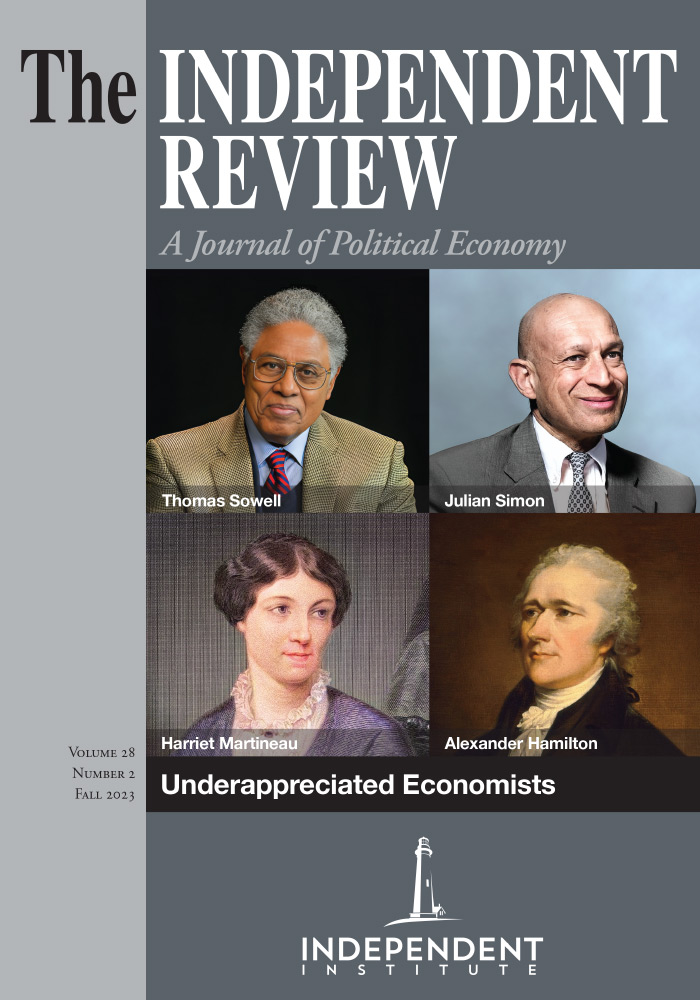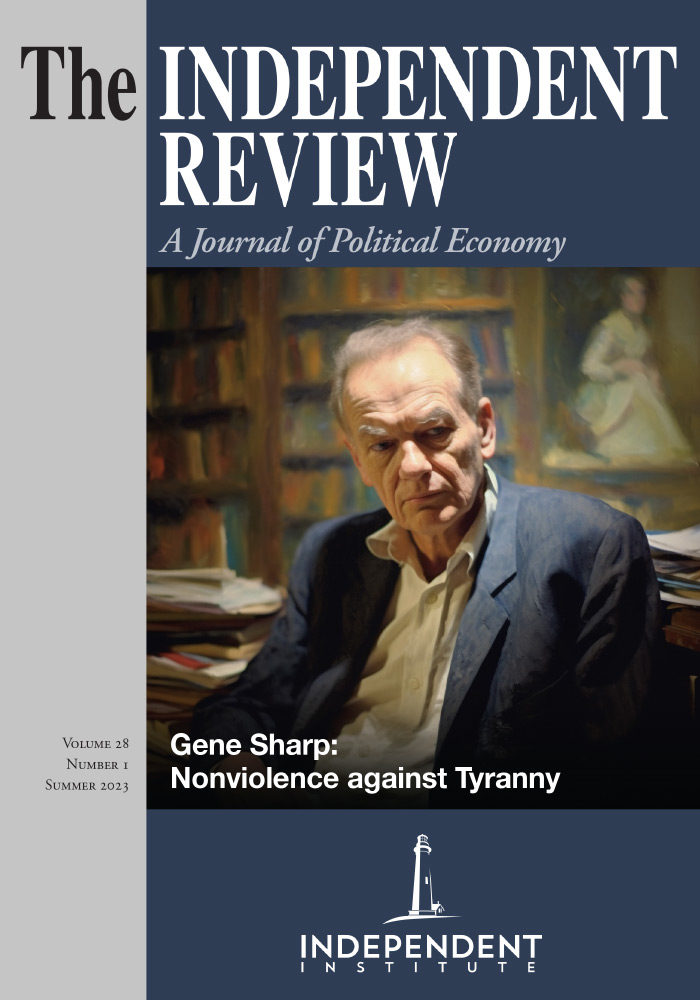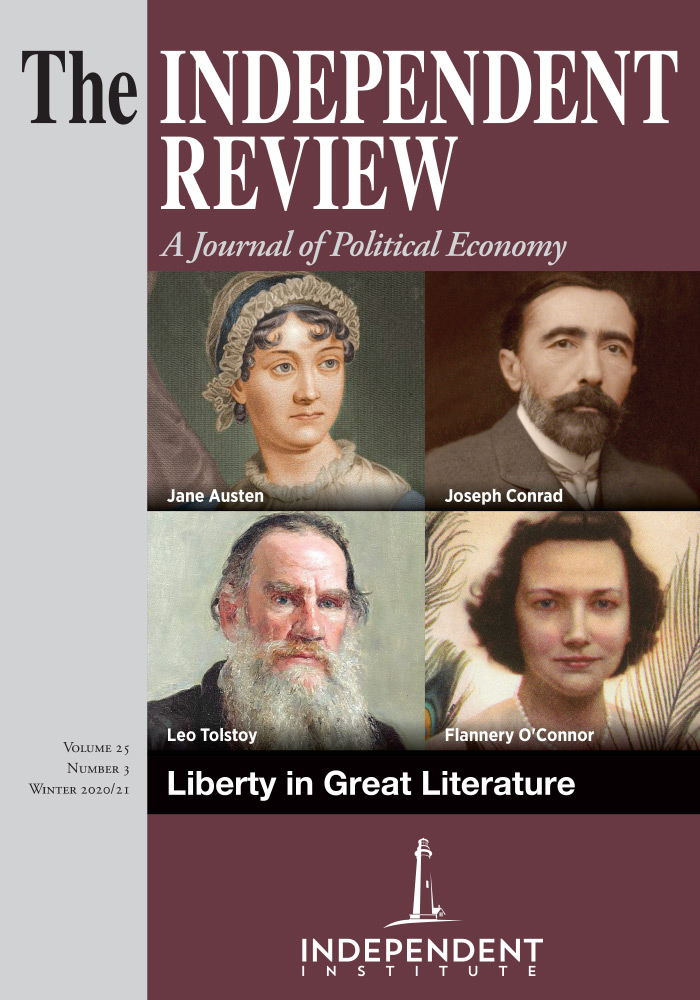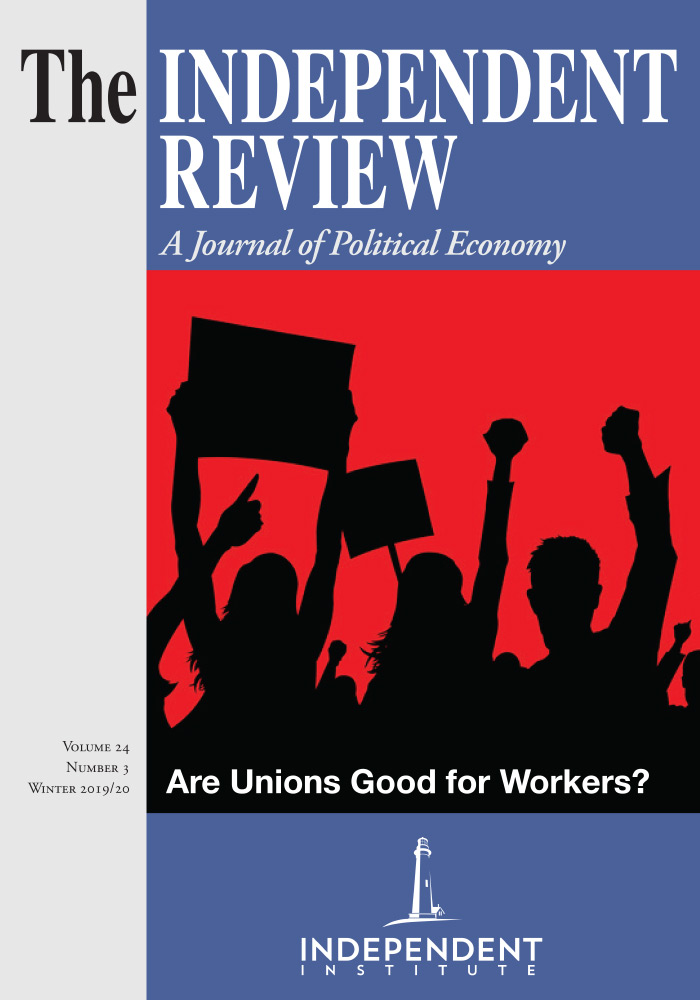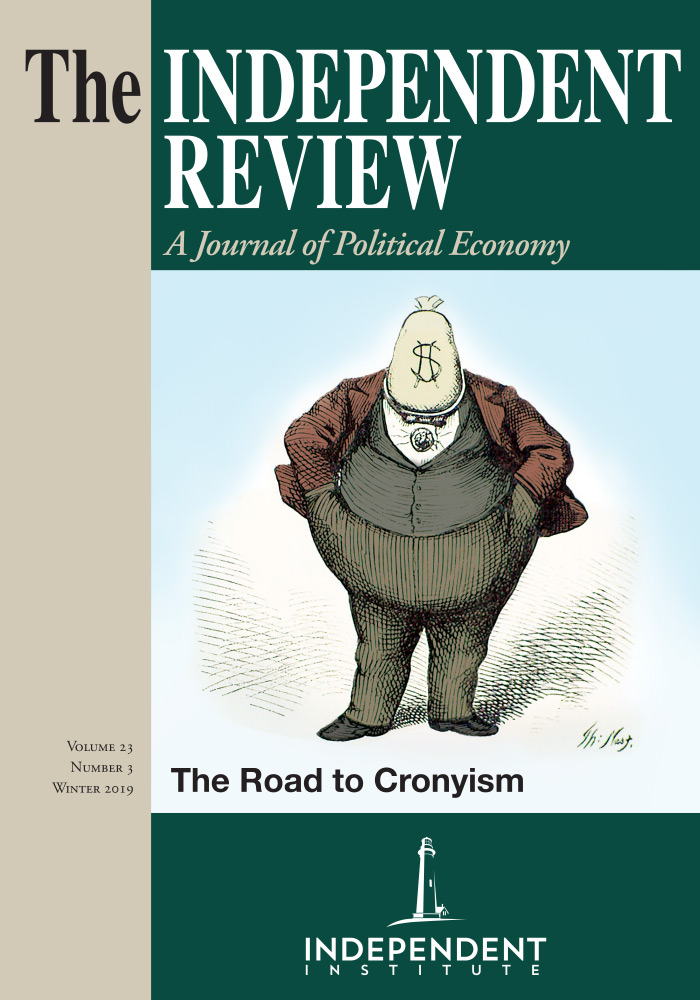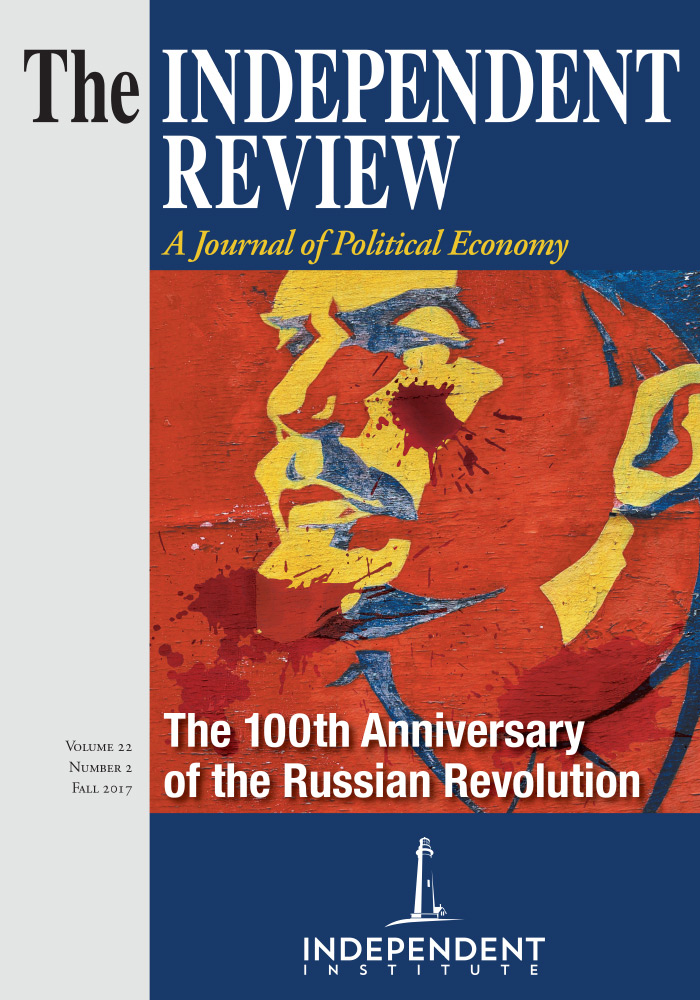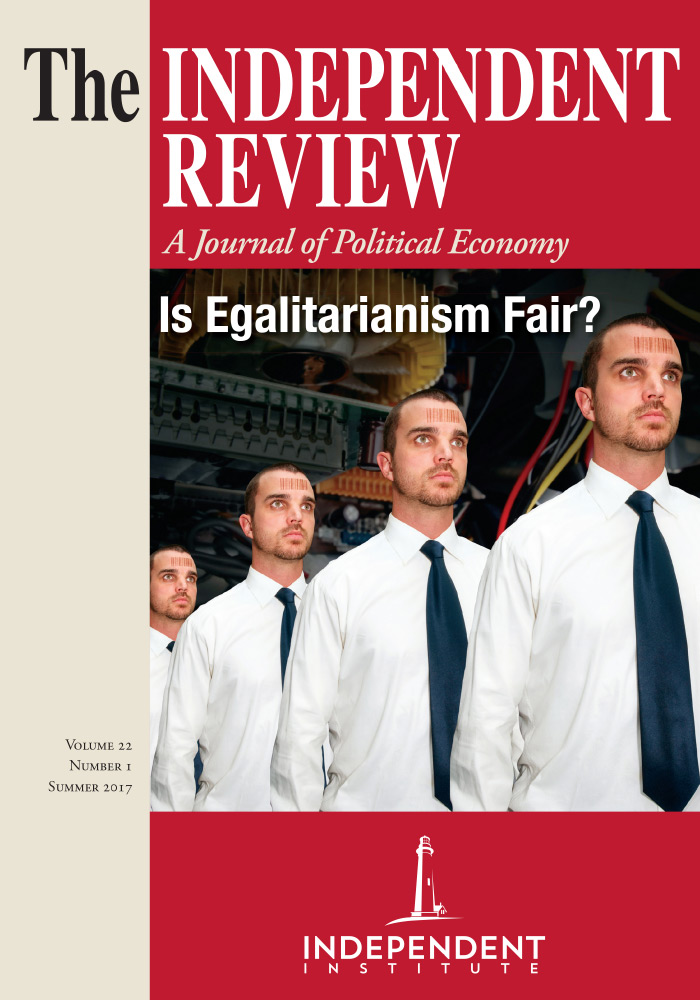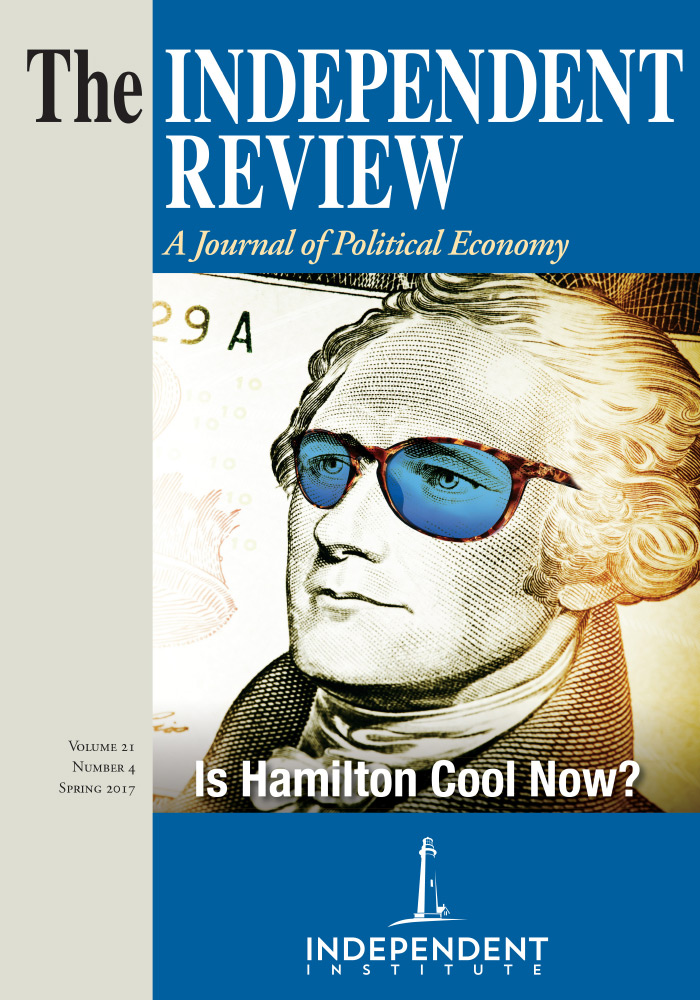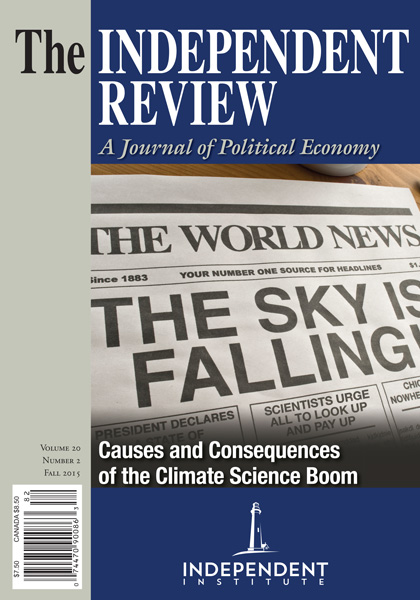This paper was selected by the editors as the winner of the $2,000 second place prize in the 2023 Independent Review Student Essay Contest, which was funded by a grant from the Pope Foundation.
Pulling Up to the Pump
In 1905, the Automobile Gas Company opened America’s first gas station in St. Louis, Missouri (Jakle and Sculle 1994, 112). Gas stations only got more popular over the years, when “by 1920 there were over 20,000 service stations in the United States—an increase of approximately 1,200 stations per year” (Jakle and Sculle 1994, 132). By 1930, there were an estimated 124,000 gas stations in the United States. The St. Louis store marked the beginning of an industry in the United States: the gas station industry. Before the advent of the gas station, car owners would often have to purchase their gasoline from local general stores and pharmacies in cans and then bring the gas to their cars (Jakle and Sculle 1994, 201). Gas stations have evolved since their inception, changing in both their design and offerings to include car washes, convenience stores, restaurants, and other features.
Today, the concept of full service (where an attendant working for the gas station pumps gas for the customer) has fallen by the wayside in favor of self-service (where the individual paying customer pumps their own gas). However, full servicewas historically the norm in terms of what gas stations offered. Self-service did not emerge until the 1930s (Jakle and Sculle 1994, 74). Jakle and Sculle (1994, 74) note that “self-service gasoline sales ... emerged in the 1960s on a large scale.” Historically, self-service was banned in many states throughout the country. The first ban was passed in Indiana in 1930 (Bradley 1996, 1366). By 1948, nine states had outlawed self-service (Bradley 1996, 1440). Johnson and Romeo (2000) note, “In 1968, only 27 states allowed the self-service dispensing of gasoline, and some of those states required that attendants be standing by.” By 1977, every state except for New Jersey and Oregon had removed their bans on self-service gasoline (Johnson and Romeo 2000, 626). With Oregon’s removal of self-service bans in 2023, New Jersey remains the only state that still has bans on self-service gas (Selsky 2023).
Standard explanations for the emergence of self-service bans invoke the public interest argument, or the idea that laws are passed to protect constituents from potential harm. As is shown in this article, a public choice analysis is a much more fitting explanation for the passing of self-service bans than the public interest view. Rent seeking and lobbying were common with the passage of self-service bans. This paper seeks to provide a history of self-service bans in the United States through the lens of public choice economics. As this paper shows, rent seeking was integral to the passing of self-service regulation in the United States.
Effects of Self-Service Bans
Arguably the most obvious effect of self-service bans is their effect on retail gasoline prices. Because of these bans, gasoline sellers must pay more in the form of labor to sell their product. This increased cost to producers means that marginal firms exit, and the total output of gasoline falls, leading to increased prices at the pump. Additionally, self-service bans serve as a barrier to entry. Firms that cannot afford the increased marginal cost of hiring gas attendants due to the ban are prevented from entering the market. Those firms never had the chance to offer consumers gas because these firms cannot enter the market. Additionally, bans prevent gas stations from competing on different margins. In an open market, some firms may make the entrepreneurial judgment that having self-service would satisfy more customers overall. On the other hand, some firms may choose not to offer self-service since they do not believe it would be profitable. This competition, in effect, gives consumers more choices at the pump for lower prices. Since competition cannot be manifested on the margin of price versus overall perceived quality, consumers are worse off. Another important aspect of bans is how they stifle innovation. The banning of self-service gasoline prevents market entrepreneurs from finding new value-creating products and services from consumers. Self-service bans, overall, make the gasoline market less competitive.
Self-Service Bans: Siphoning vs. Safety
A common explanation for the passing of self-service bans invokes what is called the “public interest” view. This view holds that self-service bans were enacted in order to protect consumers from dangerous conditions and materials. Johnson and Romeo (2000) write that “because self-service was seen as a threat to safety, many states passed laws banning its use.” In their list of public interest reasons why self-service is banned, the state of Oregon includes everything from gas being a flammable liquid and fire hazard, to the dangers of crime, to Oregon’s uniquely adverse weather causing wet pavement, to preventing discrimination against lower-income individuals, to small children being unsafe when left alone (Oregon State Legislature 2021). Scott (2007) writes, “Full-service gasoline station laws were first enacted because of safety concerns. Pumping gasoline was more dangerous when pumps had few fail-safes.” To many, including arguments made in academic literature, public interest is the predominant explanation for the passing of laws prohibiting self-service.
However, public interest arguments do not view politicians as self-interested actors (Higgs 1997, 465). The public interest view fails to view “politics without romance,” so to speak. Market actors engage in rent-seeking to gain wealth (Tollison 2012). Rather than engaging in the open market, individuals and firms seek wealth transfers via the political route. It should be noted that these transfers do not represent an increase in productivity on the open market. Additionally, “transfer seeking is at best a zero-sum activity in that it simply shuffles dollars among people and groups” (Tollison 2012). Overall, rent seeking could be best called a form of “unproductive entrepreneurship,” since these transfers provide no gain to consumers.
One common form of rent-seeking is lobbying. In the political market, individuals and firms lobby politicians and government employees (especially fire marshals) in various states to obtain wealth transfers via the banning of self-service. Gas station owners would now face less competition on the open market. Additionally, voters face high costs, generally preventing them from overturning these bans through voting. This concentrates the benefits among specific gas station owners and operators and disperses the costs among citizens of states where self-service laws were passed. Typically, these bans were supported by large station owners, since they had the capital to engage in rent seeking. This rent-seeking process began in 1930 with the advent of self-service and continued throughout the next few decades. The trend of firms desiring protectionist legislation occurred across the United States from coast to coast, ranging from Maine and New Jersey to Illinois and Louisiana to Oregon and California (Bradley 1996, 1440).
In the 1930s, the Hoosier Petroleum Company founded a chain of self-service gasoline stations in Indiana. In Indiana, that same year, the first law banning the sale of self-service gas was passed (Bradley 1996, 1366). The Hoosier Petroleum Company’s attempt at self-service ended when the state fire marshal said that self-service posed a threat to public safety as a fire hazard (Jakle and Sculle 1994, 74). With this ban in place, only gas station employees could pump gas for customers. Jakle and Sculle echo the traditional public interest argument for self-service bans—that politicians enacted these laws out of a desire to protect their constituents. However, this is not a complete explanation for the passing of Indiana’s law. Bradley (1996, 1367) writes that “the Indiana Petroleum Association, whose members feared the combination of local convenience and discount prices from cost economies, lobbied the state fire marshal, who, in highly publicized testimony, warned of the hazard of self-service.” Here, members of the Indiana Petroleum Association engaged in rent seeking to protect themselves from market competition. The stations belonging to the Hoosier Petroleum Company “saved motorists 20 percent off the full-service price” (Bradley 1996, 1367). Indiana Petroleum Association members did not earn their profits from an increase in productivity; rather, they gained their wealth from lobbying political actors to prevent a market competitor from competing on the open market.
In 1947, self-service gas started to become popular in California. Many dealer associations began to advocate the passage of self-service bans in the name of public safety. While measures to pass a self-service ban failed, these groups lobbied successfully for the banning of specific forms of advertisement (Bradley 1996, 1442). It is extremely interesting that labor unions also opposed self-service, often lobbying on behalf of their members for self-service bans (Bradley 1996, 1442). While this attempt was not successful, it only further proves the point that self-service bans were not passed or advocated for because of a concern for public safety. Rather, individuals pushed for these laws out of their own self-interest, as self-service bans reduce market competition.
In 1949, a law banning self-service was passed in New Jersey (Scott 2007). This self-service ban was enacted, as in the case of Indiana, because of gas station owners seeking protection from competition. In 1949, a cartel among gas station owners had formed in New Jersey (Mulshine 2014). A gas station operator named Irving Reingold lowered the price of his gas by three cents by introducing a self-service option to customers, an option that produced much business for Reingold. After an attempt to shut down Reingold’s station by shooting it up failed, the cartel turned to lobbying to cut out their competition (Mulshine 2014). Due to their lobbying efforts, the New Jersey Legislature passed the Retail Gasoline Dispensing Safety Act in 1949. As with other self-service laws, this law banned anyone but gas station employees from pumping gas. Just like New Jersey, in 1951, Oregon banned the sale of self-service (Scott 2007). However, by 2023, Oregon repealed its ban on self-service (Selsky 2023). New Jersey’s ban on self-service was still in effect as of 2023.
Bootleggers and Baptists: A Similar Story
The persistence of the self-service ban in New Jersey can be explained by two strains of theory: concentrated benefits versus dispersed costs and rational voter ignorance. For voters, there exists a cost of learning that there is a ballot initiative to eliminate self-service laws, as well as what the proposed legislation states. Acting upon this knowledge, furthermore, and voting to eliminate this is also a cost that voters face. Summed up, “It is irrational to be politically well-informed because the low returns from data simply do not justify their cost in time and other resources” (Downs 1957, 259). This is one reason why self-service laws persist. Additionally, the monetary costs of this ban are spread out over the entire population of the state, meaning each person must value the time that it takes to vote at less than the amount that is being siphoned off by self-service bans in the form of rents. For the benefactors of self-service bans, the profits received from the laws are artificially high. Therefore, firms that benefit from these laws will spend money to ensure that they are not overturned.
Bruce Yandle’s famous “Bootleggers and Baptists” (1983) article describes a situation similar to the bans on self-service. In the article, Yandle writes of how the bootleggers supported laws banning the sale of alcohol on Sundays, as it gave them a competitive advantage and harmed their competition. Baptists similarly support the laws, however, on religious grounds. Even though these groups have different interests, both parties agreed on one thing: passing Sunday laws. He writes, “Often people want relief not from regulation but through the protections regulation can provide” (Yandle 1983). This situation can be seen in the case of the persistence of self-service bans. While self-service bans make the market less competitive and harm consumer choice, both big business and voters have supported the persistence of bans. This has been seen in the case of self-service bans in Oregon. Johnson and Romeo note,
Throughout the 1970s and 1980s, independent gasoline retail dealers in New Jersey and Oregon were strong supporters of the ban, and, somewhat surprisingly, the general public in Oregon have supported the bans. In 1982, for example, an initiative to repeal the ban was placed before Oregon voters. Opposing the bill were independent station operators, many of whom leased their stations from the major oil companies and were fearful of being run out of business by the very companies from whom they leased their stations (2000, 626).
Even though the elimination of the ban would help consumers in terms of both price and quality, “voters overwhelmingly defeated it, 597,970 to 440,824” (Johnson and Romeo 2000, 626). In addition to specific gas station owners benefiting from self-service bans, there exist other groups that have a strong incentive to keep self-service banned. Scott (2007) writes that “today an estimated 14,000 jobs exist in New Jersey because of their self-service ban, and 8,000 jobs in Oregon (22,000 jobs total).” Gas station attendants, as well as bureaucrats who enforce bans, have a special incentive to vote for and advocate for the continuance of self-service laws. Since their jobs are not the result of market competition but rather of state intervention, these actors must continue to push for these laws. Effectively, self-service bans give special licenses to attendants, thus giving them artificially high profits. This artificially high profit is because licenses cut out individuals from entering the market, decreasing the labor supply. The large number of jobs effectively creates a voting bloc in favor of the continuance of self-service bans. Additionally, Johnson and Romeo (2000, 632) write, “The results from two margin regressions and from comparisons of margins in New Jersey and Oregon with surrounding states indicates the rise to be on the order of $0.03 to $0.05 per gallon. Given these findings, the lack of substantial opposition to the bans is understandable.” Due to information costs and voting costs, self-service bans have persisted.
Even though many states had self-service bans, only one state remains today with a self-service ban: New Jersey. One reason why most states eliminated their bans was the 1970s gas crisis. “The gas price shocks related to the 1973–74 oil crisis finally pushed more states to loosen restrictions on fueling, and price-sensitive drivers flocked to self-service options” (Lenard 2022, 18). Another, and potentially more significant, reason why self-service laws were being overturned was legal challenges and suits (Bradley 1996, 1485). This hypothesis has more explanatory power, since many states rescinded their self-service laws in the late 1960s (before the gasoline crisis in America). However, it should be noted that a complete analysis of the lifting of self-service bans goes beyond the scope of this paper.
Topping It Off
Traditionally, the public interest view has been invoked to explain the passing of self-service bans. However, both theoretical considerations and historical evidence show that the public choice view is a more fitting explanation for the advent of self-service laws. Rent seeking occurs when entrepreneurs enter the political market to obtain transfers and earn special privileges. Self-service emerged in the beginning of the 1930s and was seen as a threat to existing gasoline stations. Throughout the country, beginning in Indiana in 1930, self-service bans were passed due to lobbying and rent seeking by firms wishing to harm competition and receive artificially high profits. This pattern spread all over the country, with self-service bans being passed on the East and West coasts to states in between. Self-service bans were traditionally passed through the guise of “public safety,” typically with support from fire marshals. However, by the late 1960s, many states began to reverse their self-service bans. As of 2023, New Jersey remains the only state to keep its ban on self-service on the books. These bans persisted due to information and voting costs. They also persisted because of the concentrated benefits of bans for specific groups, as well as the dispersed costs placed on consumers by the ban. Overall, the gas station market is heavily regulated through various means regarding marketing, storage, and even zoning laws. Ultimately, self-service bans are an important factor that makes the gas station market less competitive.
References
Bradley, Robert L. 1996. Oil, Gas, and Government: The U.S. Experience. Lanham, MD: Rowman & Littlefield Publishers.
Downs, Anthony. 1957. An Economic Theory of Democracy. New York: Harper and Row.
Higgs, Robert. 1997. “Etceteras: Public Choice and Political Leadership.” Independent Review 1, no. 3: 465–67.
Jakle, John A., and Keith A. Sculle. 1994. The Gas Station in America. Baltimore, MD: Johns Hopkins University Press.
Johnson, Ronald N., and Charles J. Romeo. 2000. “The Impact of Self-Service Bans in the Retail Gasoline Market.” Review of Economics and Statistics 82, no. 4: 625–33.
Krueger, Anne O. 1974. “The Political Economy of the Rent-Seeking Society.” American Economic Review 64: 291–303.
Lenard, Jeff. 2022. “Mobility and Convenience.” Roads & Bridges 60, no. 6: 16–21.
Mulshine, Paul. 2014. “The Real Reason Self-Service Gas Was Banned in NJ: Corruption.” NJ.com, February 24.
Oregon State Legislature. 2021. “Chapter 480—Explosives; Flammable Materials; Pressure Vessels.”
Scott, Robert H. III. 2007. “Fill ’Er Up: A Study of Statewide Self-Service Gasoline Station Bans.” Challenge 50, no. 5: 103–14.
Selsky, Andrew. 2023. “Power at the Gas Pump: Oregon Lets Drivers Fuel Their Own Cars, Lifting Decades-Old Self-Service Ban.” Associated Press, August 4.
Tollison, Robert D. 2012. “The economic theory of rent seeking.” Public Choice 152,no. 1/2: 73–82.
Tullock, Gordon. 2005. Public Goods, Redistribution, and Rent Seeking. Northampton, MA: Edward Elgar Publishing.
Yandle, Bruce. 1983. “Viewpoint: Bootleggers and Baptists—The Education of a Regulatory Economist.” American Enterprise Institute, May 1.
-
The author wishes to thank Caleb Fuller, Zachary Wood, Robert L. Bradley Jr., Ben Seevers, and David Peterson for their helpful comments and suggestions. All errors fall solely on the author.

